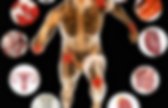

What’s So Bad About Gluten? Just after Labor Day, the Gluten and Allergen Free Expo stopped for a weekend at the Meadowlands Exposition Center.
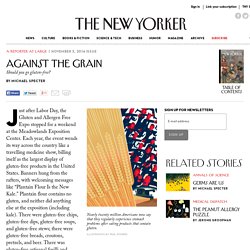
Each year, the event wends its way across the country like a travelling medicine show, billing itself as the largest display of gluten-free products in the United States. New study finds significant differences between organic and non-organic food - Press Office. An international team of experts led by Newcastle University has shown that organic crops are up to 60% higher in a number of key antioxidants than conventionally-grown ones.
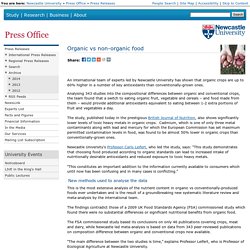
Analysing 343 studies into the compositional differences between organic and conventional crops, the team found that a switch to eating organic fruit, vegetable and cereals – and food made from them – would provide additional antioxidants equivalent to eating between 1-2 extra portions of fruit and vegetables a day. The study, published today in the prestigious British Journal of Nutrition, also shows significantly lower levels of toxic heavy metals in organic crops.
Cadmium, which is one of only three metal contaminants along with lead and mercury for which the European Commission has set maximum permitted contamination levels in food, was found to be almost 50% lower in organic crops than conventionally-grown ones. Radioactive bacteria attack pancreatic cancer. Listeria bacteria carrying the compound rhenium-188 (red) can deliver sustained doses of radiation to pancreatic-cancer cells.
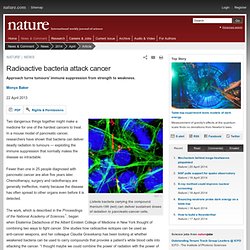
Two dangerous things together might make a medicine for one of the hardest cancers to treat. In a mouse model of pancreatic cancer, researchers have shown that bacteria can deliver deadly radiation to tumours — exploiting the immune suppression that normally makes the disease so intractable. Fewer than one in 25 people diagnosed with pancreatic cancer are alive five years later. Chemotherapy, surgery and radiotherapy are generally ineffective, mainly because the disease has often spread to other organs even before it is detected. The work, which is described in the Proceedings of the National Academy of Sciences1, began when Ekaterina Dadachova of the Albert Einstein College of Medicine in New York thought of combining two ways to fight cancer.
If MSG is so bad for you, why doesn't everyone in Asia have a headache? In the port city of Yokohama, south of Tokyo, there is a museum devoted entirely to noodle soup.

It may be Japan's favourite foodie day out: one and a half million ramen fans visit the museum every year, and even on the wintry morning that I went the queue wound 50 yards down the street - young couples, mainly: cold, hungry and excited. Inside the Yokohama Ramen Museum and Amusement Park they meet exhibitions on the evolution of soup bowls and instant noodle packets - more fascinating than you'd think, but these are not the main event. The Case for Drinking as Much Coffee as You Like - Lindsay Abrams. "What I tell patients is, if you like coffee, go ahead and drink as much as you want and can," says Dr.
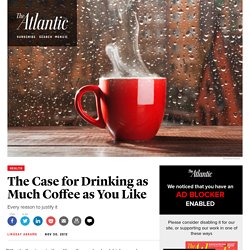
Peter Martin, director of the Institute for Coffee Studies at Vanderbilt University. He's even developed a metric for monitoring your dosage: If you are having trouble sleeping, cut back on your last cup of the day. From there, he says, "If you drink that much, it's not going to do you any harm, and it might actually help you. A lot. " Story continues below In Photos: Coffee for Health ... and Happiness? The most recent findings that support coffee as a panacea will make their premiere this December in the American Journal of Clinical Nutrition. "There have been many metabolic studies that have shown that caffeine, in the short term, increases your blood glucose levels and increases insulin resistance," Shilpa Bhupathiraju, a research fellow at the Harvard School of Public Health's Department of Nutrition and the study's lead author, told me.
Smlp.co.uk. Early Arrival. How Do Pain Relievers Work? Flexible Adult Stem Cells, Right There In Your Eye. For whom the cell tolls: Why your phone may (or may not) be killing you—By Nathaniel Rich. Niacin Brings No Benefit to Heart Patients - Heart Disease and Other Cardiovascular Conditions on MedicineNet. By Steven ReinbergHealthDay Reporter THURSDAY, May 26 (HealthDay News) -- Although early research had suggested that the nutrient niacin might raise levels of "good" cholesterol and thwart heart attacks, a major clinical trial has been stopped 18 months early because it has shown no such benefit.
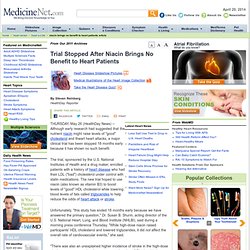
The trial, sponsored by the U.S. National Institutes of Health and a drug maker, enrolled patients with a history of heart disease who had their LDL ("bad") cholesterol under control with statin medications. The new trial hoped to use niacin (also known as vitamin B3) to boost levels of "good" HDL cholesterol while lowering blood levels of fats called triglycerides to help reduce the odds of heart attack or stroke. Unfortunately, "this study has ended 18 months early because we have answered the primary question," Dr. Salt, blood pressure and health: a cautionary tale. Michael H Alderman + Author Affiliations By virtue of its central role in maintaining intravascular and extracellular volume, sodium is essential to human survival.
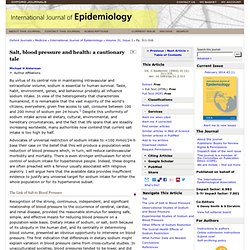
Taste, habit, environment, genes, and behaviour probably all influence sodium intake.